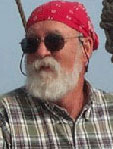Breaking Dennett's spell
 Numenware readers are busy people. So here’s a handy, one-paragraph summary of Daniel C. Dennett’s new book, Breaking the Spell: Religion as a Natural Phenomenon, to save you the hours required to plow through its 400 pages and the $25.95 you’d have to spend to buy it:
Numenware readers are busy people. So here’s a handy, one-paragraph summary of Daniel C. Dennett’s new book, Breaking the Spell: Religion as a Natural Phenomenon, to save you the hours required to plow through its 400 pages and the $25.95 you’d have to spend to buy it:
I’m Daniel Dennett, and I think religion is stupid, and everybody should stop believing in it right now, because I’m real smart and I say so. Besides, it’s just an evolutionary and cultural thing according to some books I read. Don’t get me wrong, though: some of my best friends are religious, and a lot of them are real nice people!
Dennett spends the first chapter talking about an alleged vast conspiracy striving to prevent people like him from looking at religion objectively . That’s odd, given the centuries of research on the topic.
Dennett argues vociferously for a scientific analysis of religion. Which is doubly odd, since he’s obviously made up his mind already. And the only scientific “evidence” he himself quotes is cribbed from people who actually did work on the topic, such as Boyer (earlier post) and Atran (earlier post). He gives a sloppy summary of their work.
Triply odd is what Dennett leaves out of his “daring and important” new book, which is anything about what people experience in religion. He fails to mention, much less categorize or analyze, any transcendental experiences beyond those of the beautiful sunset variety.
Dennett gives short shrift to the biological seat of religious experience—the brain. His treatment of the topic is limited to the mention of one paragraph in Atran’s book. He dismisses D’Aquili and his “AUB” (Absolute Unitary Being) concept with its neural correlates in a single sentence.
The book is desperately in need of a fact checker, an editor, or, preferably, a ghost writer. Dennett is unable to maintain one train of thought for one section, much less an entire chapter. The book is cluttered with distracting soliloquies and asides. He doesn’t understand the concept of a scientific theory, imagining that it becomes a “fact” after it’s “proven”. He calls Jared Diamond a “pioneer who did scientific work on religion.” He refers to “Shinto temples of surreal intricacy and precision” (Shinto has shrines, not temples, and they’re austere in the extreme). He conflates the evolutionary and cultural aspects of the development of religion by treating genes and memes, of which he is much enamored (to the point of including in the book a disconnected appendix in their defense), as equivalent selective mechanisms.
Dennett thinks that a historical account developed is equivalent to understanding what it means—an odd stance for America’s putative leading philosopher.
Dennett waves off criticsm with gratuitous displays of feigned modesty, weak calls for “further inquiry”, and, in the ultimate irony, pre-emptive attacks on those who might disagree—proclaiming some of them infidels unworthy of even casting their eyes on his holy writ.
It’s really too bad. Someone with Dennett’s intellect and clout could have written a book on this timely topic that would really have changed the terms of the discussion . Myopic, slovenly, repetitive, disorganized, and biased, this book disastrously fails to fulfill that promise .

March 25th, 2006 at 05:54
Coming to this post
From unfolding puzzle
It is sad to see
The lack of humility
Before the mystery
Of such a leading writer
In philosopy and science.
March 26th, 2006 at 13:29
Mr. Numenware (what’s wrong with old fashioned names?)
While I can agree with some of your criticisms, your tone of anger is misplaced. Social-historical analyisis can never be proven in the way of hard sciences. We can only posit relational constructs that either have hortatory, explanatory value, or do not.
Rather than vehement criticism over the books limits and the author’s hubris, if you are a rationalist rather than a believer you should see his book as a point of departure. I have attempted this on my blog alrodbell.blogspot.com which I recomend to you and your readers
His book raises the question of how Religion can at times be virulent, such as we are seeing in current Islam, and how it can also be conducive to great social betterment, as in the Golden Age of Islam of the eighth century (I think.) Consider his book as a flawed first draft of a vital subject that we all should explore
November 25th, 2006 at 07:14
A good critic. Dennett shakes all consepts
an misunderstund them.
Thank you
March 25th, 2007 at 12:18
I couldn’t agree more with Al’s comment, with the possible exception of his “hard sciences” comment. No theory in science is proven beyond doubt, because an alternative theory, however convoluted, can always be devised to explain the same observations.
Amazingly, that self-doubt is the very essence of why science is so successful in uncovering nature’s secrets!
It’s easy to be a scientist yourself! Just challenge your most charished ideas (such as that transcendental experiences are an objective reason to believe something) and see if you can change your own mind.
“Where there is doubt, there is truth”
September 23rd, 2007 at 07:50
I red that book. Sorry to say but it really is too bad. It’s of fantasy written by an ateist. More frankly: it is of atheist probaganda.
November 30th, 2009 at 09:16
[…] book resembles Dennett’s Breaking the Spell Anna and the King download in its condemnation of “faith”, but is much more coherent […]